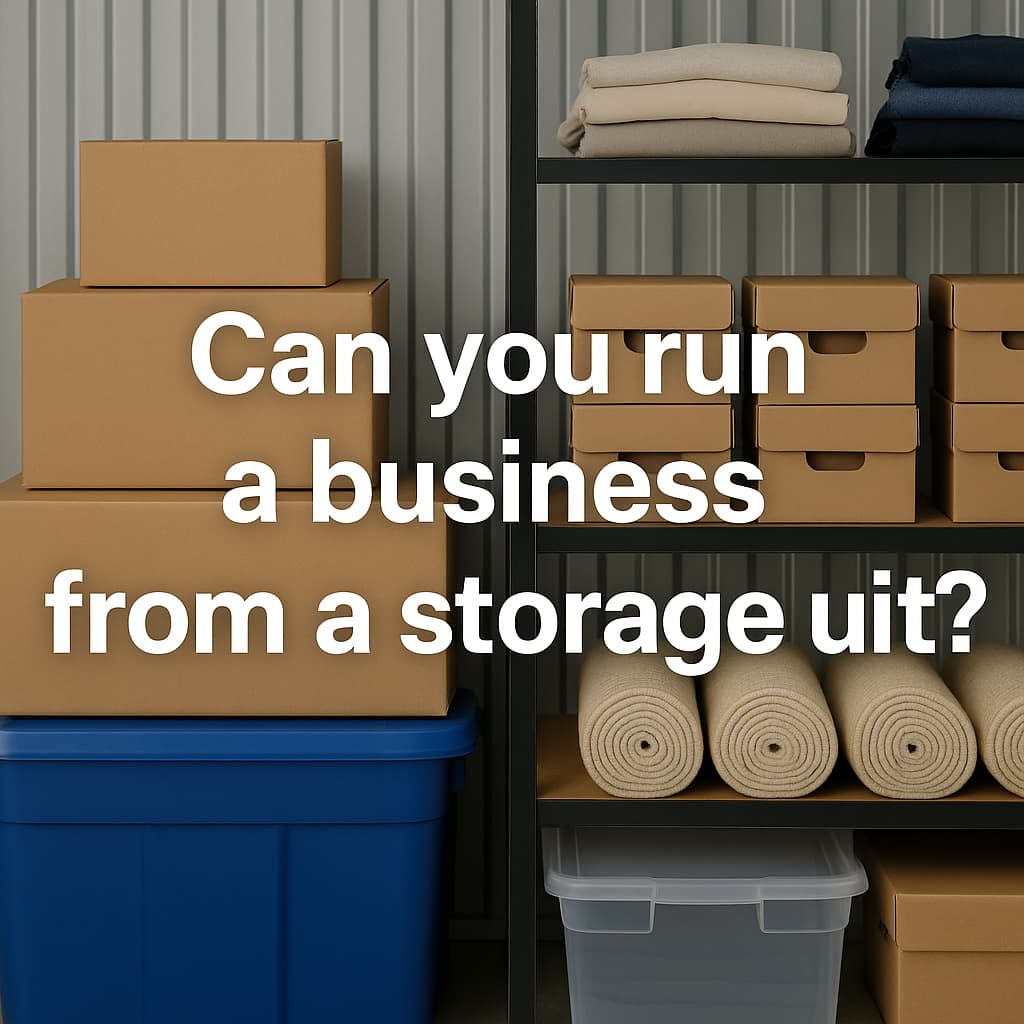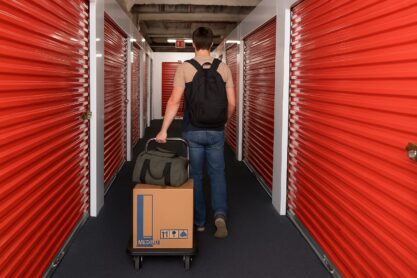The idea of running a business from a storage unit might sound tempting, especially if you’re looking for a low-cost base. But the reality is a little different.
Most storage providers are happy for you to keep your goods there, but they draw the line at working from the unit. Meetings, serving customers, or turning it into a mini office just aren’t allowed. Storage units don’t have lighting, power, or the facilities you’d need for daily operations, and managers prefer to avoid the disruption of people setting up shop inside.
How to actually Make a Storage Unit Work for Your Business
Storage units can’t double as your workplace, but they can still be a valuable part of your setup. In fact, 24% of storage users rely on their unit as a core part of what they do, from keeping inventory and tools to acting as a drop-off and pick-up hub. They’re highly versatile, making them ideal for businesses ranging from online shops and tradespeople to freelancers and start-ups.
The bottom line: a storage unit delivers many of the same benefits as commercial space at a fraction of the cost.
The benefits of using storage for your business
They’re Cheaper than Traditional Office or Retail Space
On average, self storage costs around £29.13 per square foot per year nationwide. Retail space, meanwhile, ranges from £25–£40 per square foot annually, while conventional office leases can range from £20 in smaller towns to £150 in prime city locations. If you’re planning on storing inventory long-term, switching to a storage unit could save you thousands of pounds each year.
Unit Sizes for Every Stock Size
Traditional storage units generally range from around 10 square feet (a small locker) to 200 square feet, with shipping containers also available that can go up to around 320 square feet. This allows anyone, from the start-up with a few boxes of stock to the established retailer managing large pallets of inventory, to find a unit size that suits their needs.
your goods are protected around the clock
On top of simply having your unit locked with a padlock, most storage facilities come equipped with various security measures and protocols to prevent break-ins. Henfield Storage, for example, has 24/7 CCTV, on-site staff who patrol the area, bright lighting to keep all areas visible, and security fencing to deter unauthorised access. Contrast to a garage, shed, back room, or van, where your items are more vulnerable to theft or damage.
The’re often closeby
Henfield Storage alone has four facilities situated across London, all accessible via public transport and car. This is why you’ll want your chosen unit to be within a few miles of your business location, making it easy to collect or drop off items when needed.
But if you don’t need to frequently access your stock, some facilities offer collection and delivery services, meaning they can bring your items straight to your business address when required.
Additional Services for Businesses
Some facilities offer more than just storage space. You might get access to packaging supplies, parcel handling, meeting rooms, or even short-term office space on-site. These extras can make it easier to run day-to-day operations without having to deal with multiple service providers.
you’ll Save More by storing long-term
Businesses more often than not use their storage spaces for the long term, upsizing as they scale. This means storage units are often rented for several months or even years, provided the arrangement continues to meet the company’s needs.
Most storage companies offer generous discounts for long-term stays, simply because it guarantees them consistent occupancy. Committing to a longer rental period can lower your monthly rate and deliver significant savings over time, making it even more cost-effective for businesses that need reliable storage year-round.
Business Models That Work Well With Storage

Even if you can’t operate your business directly from a storage unit, that doesn’t mean it can’t play a big role. Many businesses thrive with a storage-based setup. Here are some common examples:
1. Retail and Ecommerce
Retailers, both online and at stalls, can benefit from storage units. They avoid cluttering their back rooms or renting warehouses. A storage unit lets you adjust space as your needs change:
- Ecommerce stores (Amazon, eBay, Etsy, etc.) – store inventory and pack orders away from home.
- Market traders – keep stock, stands and displays safe between trading days.
- Thrift and vintage resellers – hold sourced items securely until they sell.
- Catalogue sellers – manage samples and deliveries from a central base.
2. Trades and Small Businesses
Storage units are great for trades and small businesses. They provide a secure place for tools, materials, or bulky items.
- Tradespeople (plumbers, builders, electricians, etc.) – keep tools and spare parts secure instead of leaving them in vans.
- Furniture restoration and upholstery – store bulky projects and fabrics safely until collection.
- Heating engineers and car spares retailers – hold larger or specialist parts in a dry, accessible location.
3. creative and Handmade
Makers and designers can expand their space with a storage unit. It helps them grow beyond their home or workshop.
- Clothing and jewellery designers – store fabrics, samples and finished pieces securely.
- Furniture flipping – keep upcycled items safe until sold.
- Crafts and makers (resin art, pottery, cards, etc.) – hold materials and completed goods in a clean, dry space.
4. Events and Community
Event-based and community groups need flexible storage for bulky equipment.
- Event and exhibition suppliers – keep marquees, props and AV gear ready for use.
- Mobile caterers – store tables, serving gear and non-perishables between events.
- Sports clubs – keep kits and equipment secure and accessible.
- Fundraisers and charities – hold raffle prizes, stock or marketing materials in one place.
5. Larger and Industrial
Big companies don’t always need a full warehouse. They can use large container-style units for pallets, machinery, or seasonal overflow stock.
- Construction firms, retailers and import/export businesses – use large container-style units for pallets, machinery or seasonal overflow stock.
6. Office and Records
For some businesses, storage is about paperwork rather than products. They use units for climate-controlled storage of files.
- Accountants, solicitors and other professionals – archive files in climate-controlled units for long-term safekeeping.
FAQs about Running a Business from a Storage Unit
Can I legally run a business from a storage unit?
Generally speaking, most places won’t let you trade, serve customers, or have an office in their storage units. However, there are exceptions where facility managers will allow certain low-impact uses, like storing stock, tools, or paperwork, as long as you’re not disrupting the site. The key is to check with your chosen facility, since rules can vary.
Note: Henfield Storage welcomes business customers who need extra space for stock, equipment, or archives, but we don’t allow units to be used as active trading spaces.
Can I use a storage unit as a registered business address?
It depends. Some places say yes, others no. Always ask your storage unit first.
What type of businesses benefit most from storage?
E-commerce sellers, tradespeople, freelancers, and small start-ups do well as many UK storage providers offer cheap storage for stock or equipment.
Do storage units have electricity or Wi-Fi?
No, they don’t. They’re made for storing things, not for work. If you need power, you might need a commercial unit.
Is business insurance included with storage units?
Henfield Storage provides insurance cover for the contents of your unit. This protects what you store inside, but it doesn’t extend to wider business activities. For that, you’ll need to arrange separate business insurance.
Get a Quote for Business Storage Today
Join hundreds of businesses in London and West Sussex who trust Henfield Storage for safe and affordable business storage. Call 020 8003 4222 or use our space estimator to secure your unit.




